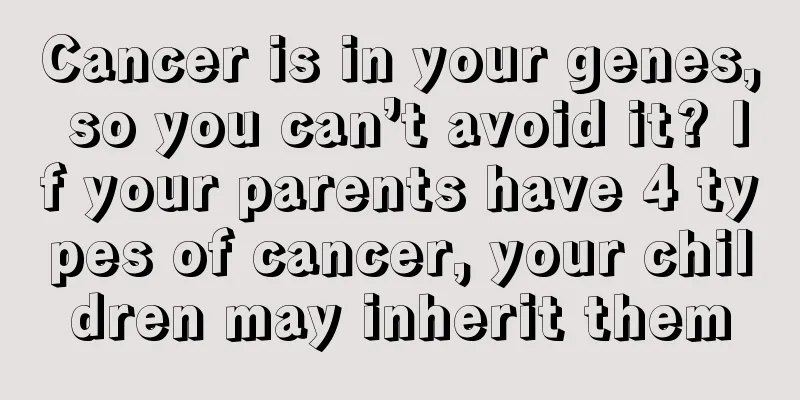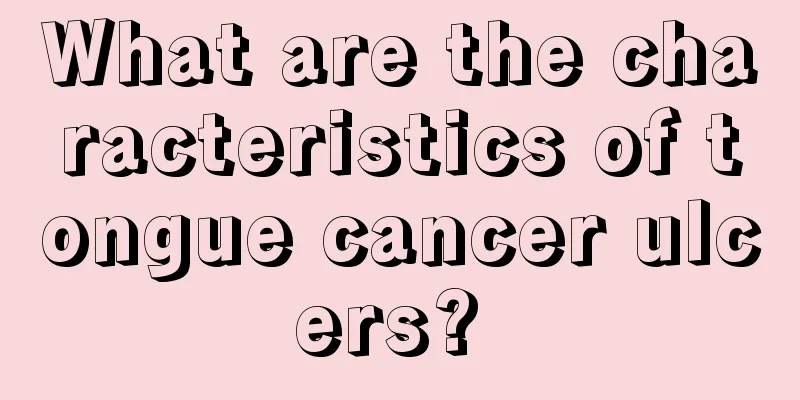Cancer is in your genes, so you can’t avoid it? If your parents have 4 types of cancer, your children may inherit them

|
Whenever you hear the word "cancer", do you feel like a stone hits your heart? Don't worry, I'm not here to "deepen your sorrow", but to talk to you about how we should face this "invisible killer". First of all, I want to "pour a basin of cold water" on you: cancer is indeed closely related to our genes. Some people may be born with "cancer genes", and these bad guys are like "time bombs" lurking in our bodies, which may explode at any time. However, please note that this does not mean that cancer is "destined", and we cannot just sit and wait for death! Speaking of this, I would like to tell you a real case. I had a patient before, let’s call him Mr. Li. Mr. Li’s family has a “cancer tradition”; his father, uncle, and grandfather all died of cancer. Therefore, Mr. Li always felt that he "could not escape" this fate and once fell into extreme panic and depression. But is this really the case? Mr. Li later found me and hoped that I could give him some advice. I told him that although family history is an important factor in the development of cancer, we cannot rely entirely on it to predict the future. The hereditary nature of cancer does not mean that a person will definitely inherit cancer from their parents. Instead, it means they may be at higher risk, especially if their parents were diagnosed with cancer at a young age. However, even if you have a genetic risk, it doesn't mean that you can't take actions to reduce the likelihood of developing cancer. But for these four types of cancer, if the father has them, there is a high chance that the children will inherit them. Breast cancer: The main susceptibility genes for breast cancer are BRCA1 and BRCA2. 5%-10% of breast cancers are related to genetic inheritance. Ovarian cancer: Approximately 20%-25% of epithelial ovarian cancers are related to genetic factors. Colorectal cancer: If a parent has colorectal cancer caused by familial colon polyps, their children have a 50% chance of developing the same cancer. Gastric cancer: Relatives of gastric cancer patients have a 2-3 times higher risk of developing gastric cancer than other people. Although genetic factors increase the risk of cancer in some people, lifestyle choices can also significantly influence cancer risk. For example, smoking, drinking, unhealthy eating habits and irregular lifestyle habits may increase the risk of cancer. By making these lifestyle changes, you can significantly reduce your cancer risk, even if you have a genetic risk. In general, although the genetic risk of cancer cannot be ignored, we must also realize that through a healthy lifestyle and regular physical examinations, we can effectively reduce the risk of cancer. If you have a family history of cancer, it's best to talk to your doctor to understand your personal risk and develop prevention strategies accordingly. Because the occurrence of cancer is a complex process, in addition to gene mutations, factors such as environment, lifestyle, and eating habits also play a vital role. So, how do we deal with these hereditary cancers? Regular medical check-ups Regular physical examinations are key to preventing and detecting cancer early. If there is a family history of cancer, it is recommended to undergo regular cancer screening, such as breast cancer screening, colorectal cancer screening, etc. Healthy Lifestyle Leading a healthy lifestyle can significantly reduce the risk of cancer. This includes eating a balanced diet, getting enough exercise, and avoiding smoking and excessive drinking. Genetic counseling If more than one family member has had cancer, or if cancer occurs in a younger family member, genetic counseling may be needed. Genetic counseling can help assess an individual's cancer risk and provide personalized prevention recommendations. Preventive treatment In some cases, preventive treatment measures, such as surgical removal of high-risk organ parts, may be necessary. For example, women who carry a hereditary breast cancer gene may need to undergo a mastectomy under the guidance of a doctor. In addition to these, exercising more, getting enough sleep, and avoiding excessive stress can all help us reduce the risk of cancer. Although the genetic risk of cancer cannot be completely eliminated, the risk can be effectively reduced through the above-mentioned preventive measures. It's important to work with a medical professional, get regular checkups, and adopt a healthy lifestyle. If you have a family history of cancer, it is recommended that you discuss your personal risk with your doctor as early as possible and develop an appropriate prevention plan. After listening to my advice, Mr. Li began to actively change his lifestyle and have regular physical examinations. Several years later, he remained in good health and never showed any signs of cancer. So, you see, cancer is not our inevitable “fate”. As long as we understand it, face it, and take positive measures to deal with it, we will definitely be able to defeat it! Remember, our body is our most precious treasure, so we must cherish it! Well, that's all for today. If you have any questions or want to know more about health and wellness, please feel free to ask me. I will do my best to answer your questions and provide help. Let's work together to pursue a healthier and better life! |
Recommend
The efficacy and function of hibiscus stone
In China, in addition to traditional gold, many p...
What are the sequelae of sudden cerebral hemorrhage?
With the increase of life pressure, cerebral hemo...
What are the signs of ovarian cancer
What are the signs of ovarian cancer? 1. Pain in ...
Tips: Three methods for treating nasopharyngeal carcinoma
Many people may be familiar with nasopharyngeal c...
How to check blood type
Each of us has our own unique blood type and diff...
What are the drugs for treating epididymitis
Epididymitis is a very common male disease and al...
Apple cheek filling failed
The apple muscles are the muscles on people's...
What is the best way to examine the small intestine?
The human abdomen has a densely packed digestive ...
How to remove oil stains from clothes
Many housewives have this problem: no matter how ...
What are the sequelae of purulent encephalitis
Purulent encephalitis is also a type of encephali...
How to soak Cassia seeds in water
Drinking Cassia seeds soaked in water is very eff...
Will gastric stromal tumor recur after surgery? It is easy to recur, so be careful
Gastric stromal tumors are prone to recurrence af...
Indications for bladder pacemaker
There is an old Chinese saying that a living pers...
What medicine can kill wireworms
Wireworms are a type of pest, and are the larvae ...
What causes aplastic anemia?
Aplastic anemia is mainly caused by the damage of...









